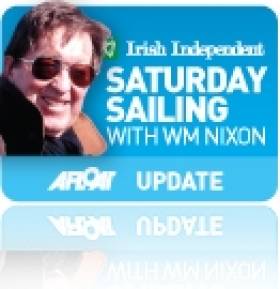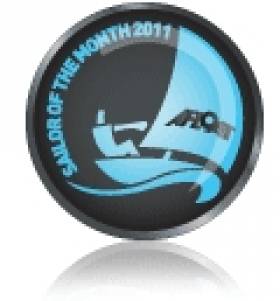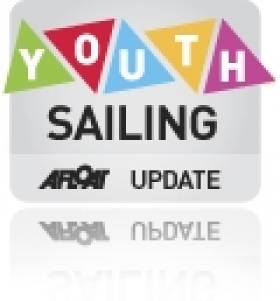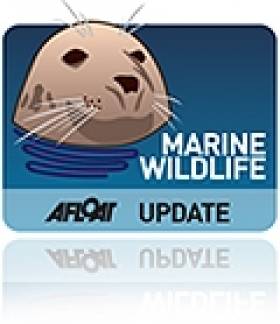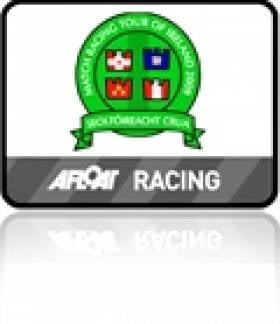Displaying items by tag: Student
Sailing Needs Students
#icra – Like all consumer sports, sailing has taken something of a battering during the years of recession. The hard core dedicated enthusiasts are still actively involved, for nothing will deflect the true old salt from his or her destiny in and around boats. But many of those who took up sailing as just one of several lifestyle choices in the affluent times have faded away.
It's an ill wind that blows nobody any good. For anyone thinking of returning to sailing, or maybe getting involved for the first time, there's no better time than the present. The infrastructure is there to facilitate manageable expansion, and the people running the sport are keen to recruit newcomers, and bring back those who have strayed.
One area which is proving to be a happy hunting ground is university sailing. That said, it could equally be argued that it is the prodigious pace being set by the college matelots which is prodding the rest of the sailing community into positive action. Call it as you like, but the fact that the Galway University offshore racing boat was hailed as the latest ICRA Boat of the Year at the annual offshore racing conference last weekend struck us as being a very timely move.
We say that despite last week's column being prepared to wager a portion of the housekeeping on another boat altogether. We'll spare their blushes by not naming them, but up against the Galway juggernaut, all opposition fell astern. Team leader Cathal Clarke and his squad from the City of the Tribes put in a fantastic year with Martin Breen's Reflex 38, and as the entire crew were either students or recent graduates from NUIG, they provide the perfect personnel profile to make a healthy and useful longterm input into sailing.
Newly-elected ICRA Commodore Norbert Reilly of Howth is in no doubt that Irish sailing numbers have scope for expansion, and the 2013 programme will certainly keep those involved mighty busy. From early June until mid-July, you could be sailing with an offshore orientation almost continually, with the Dun Laoghaire to Dingle Race on 8th June, then on from Dingle to the ICRA Nationals round the corner in Tralee Bay from June 13th to 15th, then it's back to the south coast for the Sovereigns Cup at Kinsale from 26th to 29th June, followed by a return to the east coast with the Volvo Dun Laoghaire regatta from 11th to 14th July.
The scope which this programme provides for introducing new crews to the sport is enormous, and it will certainly sort out the faint-hearted. The real hard chaws meanwhile will barely be up to speed by mid-July - like the Galway college offshore racing team, they'll be thinking in terms of the Fastnet Race in August.
And for anyone who complains that this is an awful lot of sailing, the answer is usually a brusque comment that, once your time comes, you'll not be sailing for a very long time indeed. Thus our thoughts this weekend are with Cork sailor Kieran Walsh. He's working in Dubai, but this week has been sailing as crew aboard Doug Worrall's First 36.7 Shahrazad in the annual Dubai to Muscat race, a three day RORC event.
You need to do such things to offset the rigours of working in the desert. But they did rather better than that. They won. It's a tough old life, but somebody has to do it.
THE GAFFER OF THE GAFFERS
Tim Magennis, newly-elected President of the Dublin Bay Old Gaffers Association, was in fine form on Tuesday night as he welcomed an eclectic and enthusiastic audience to Sean Cullen's presentation about INFOMAR in Poolbeg Y&BC under the auspices of the Old Gaffers. INFOMAR is the twenty year programme - currently in its twelfth year – to survey the seabed around Ireland and the adjacent ocean in unprecedented detail, and Sean Cullen has proven such a dab hand in charge of the survey ship that he is consulted by other nations keen to get in on the acquisition of knowledge of the deep.
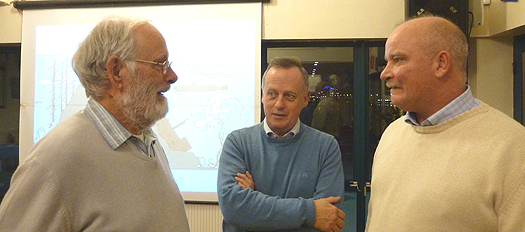
The Boyd men of Poolbeg. Owners of Herbert Boyd-designed classics at the OGA gathering in Poolbeg Y&BC are (left to right) Tim Magennis (Marguerite, 1894), Ian Malcolm (Aura, 1898) and Sean Cullen (Eithne, 1893). Photo: W M Nixon
As for Tim Magennis, it made for a high profile week, as he had something of a starring role on Thursday night in TG4's extensive filmed documentary about Erskine Childers. Most appropriately, the guru of the gaffers was involved on the television programme to explain the skills involved in sailing the engineless Asgard to Howth with the cargo of guns in July 1914, and especially to highlight the sheer brilliance with which Molly Childers helmed Asgard to bring her gently alongside the pier, neatly head to wind in a strong nor'wester, a formidable display of seamanship.
Sean Cullen's work in surveying the seas of Ireland and their hidden depths is fascinating. And it's a bit scary to discover just how much is still to be discovered, when we tend to assume every major hazard has been known about and on the charts for decades. The most striking example of this is a previously unknown pinnacle rock a few miles westward of Slyne Head. There's 12 metres over it, which explains why it has gone undetected for so long. But as the rock is a bit like St Patrick's Cathedral plonked down in the middle of an otherwise fairly flat bit of the seabed, until it was discovered it represented a potential danger for any supertankers which happened to be proceeding up the west coast of Ireland.
OLD BOATS ON A COLD COLD SEA
The gaff enthusiasts of Dublin Bay are gearing themselves up to welcome fellow gaffers at the June Bank Holiday weekend next year, as Dublin Bay will be an important focal point in the Irish Sea for the rolling cruise-in-company with which the many branches of the OGA will be celebrating its Golden Jubilee.
Of course, for some folk in Ireland, making a song and dance about preserving gaff rig seems decidedly weird. It's not that this select group have rejected gaff rig entirely. On the contrary, as far as the Howth 17s are concerned, it never went away. They still sail their boats rigged exactly as they were designed in 1898 by Herbert Boyd, and they see little reason to change.
The OGA gathering in Poolbeg provided a rare opportunity for the owner-skippers of three different Herbert Boyd-designed gaff classics to get together. Sean Cullen owns the 25ft Eithne, the first Boyd yacht, built by Boyd himself in the boathouse at Howth House in 1893. Tim Magennis owns the 24ft Marguerite (that was Marguerite in the early part of the Childers film), which was built by Jack Wellington, a sailor/boatbuilder from Scandinavia who somehow acquired the name Wellington when he settled in Malahide. And Ian Malcolm owns the Howth 17 Aura, one of the original batch of five Howth 17s which were built by John Hilditch of Carrickfergus in 1898, and sailed home to Howth by their owners.
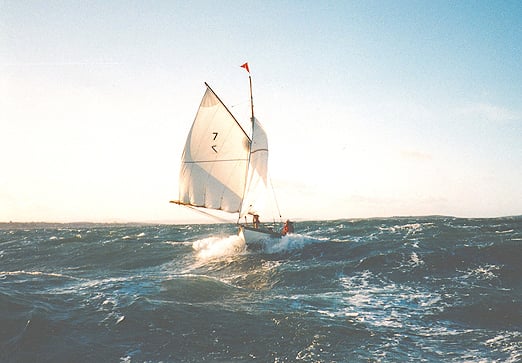
Baby, it's cold outside.... Ian Malcolm's Howth 17 Aura sailing from Carrickfergus to Howth on the evening of April 15th 1998 to celebrate the Centenary of the first five boats of the class making the same delivery passage in April 1898. The land just visible is the County Down coast on the left, the Antrim coast in the distance, and Copeland Island on the right. Photo: Damien Cronin
That inaugural voyage of the Howth 17s was replicated for the Class's Centenary in April 1998 in a strong and very cold nor'easterly wind. At least it was a fair wind, but conditions were otherwise Arctic. As one of those who took part, Ian Malcolm, was uniquely qualified on Tuesday night to tell the OGA enthusiasts about what is involved in sailing vintage gaff rigged yachts from Belfast Lough to Dublin Bay, which will be part of the Golden Jubilee programme.
But at least they'll be doing it in June rather than April, and they'll be doing it in boats with lids rather than a Howth 17, which passes the Number One test for a genuine classic – they're diabolically uncomfortable boats to crew aboard, even in pleasant conditions. In April 1998 with temperatures plunging towards freezing point during the overnight 85 mile sail, they were torture chambers, but the crews didn't notice - they were completely numb with cold......
George Kenefick is October's Sailor of the Month
The 23-year-old helmsman won the Quarter Ton Classics Corinthian Division in July with his immaculately-restored boat Tiger, racing against a top lineup in the Solent. That performance saw him recruited to helm the English-owned boat Chimp in the Half Ton Worlds at the same venue in August. Kenefick showed the quality of his abilities by interacting with a crew he'd never sailed with before to become overall winner against an impressive international fleet.
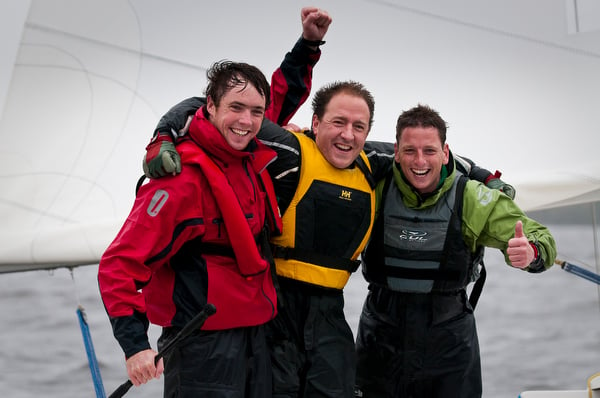
George Kenefick, Mel Collins and John Downey celebrate their win on Lough Derg. Photo: Brendan Fogarty
Back in home waters, next up was the Waterways Ireland ISA National Championship on Lough Derg in the ISA's SailFleet flotilla of J/80s at the beginning of October. For this series Kenefick recruited Crosshaven clubmates John Downey and Mel Collins as crew. The opposition included former champion Mark Mansfield, who had returned to competitive sailing by winning the 1720 Europeans in Baltimore against a fleet including Anthony and Nicholas O'Leary, both former Irish Open Champions.
It went right down to the wire, with Mansfield and O'Leary emerging well ahead on 12–points apiece. On the countback, Kenefick was the new champion. Almost immediately, he was back in the thick of logistics and personnel organization in taking the Cork Institute of Technology sailing team to France for the Student Worlds, CIT representing Ireland as winners of our national series.
With sixteen college teams from all over the world, even in resources-rich French sailing the organizers were stretched in finding an evenly-matched fleet of sixteen Archambault keelboats. There were top class new boats, but some not so new boats, and a trio of boats well past their sell-by date. It was all in the luck of the draw, and the Irish and much-fancied Portuguese found themselves drawing the shortest straw.
In a demanding series, the Portuguese were never at the races with their tired mount, but the Irish simply refused to give up despite a boat which, with its equipment, was falling apart. There was ample opportunity to do this, as the series in the Bay of Biscay off La Trinite included some really rough stuff. In fact, the Irish revelled in the strong breeze, but in the light airs which settled in as the week drew on, it took pure skill.
By the final races last Saturday, they'd got themselves an unassailable third position, but the two British teams – defending champions are allowed an extra place – had miscalculated the points situation. So on the final day, they team raced, one of their boats sailing the Irish crew down the fleet in the best Ben Ainslie style. It was the first time Ireland had finished outside the top six, but they still had the bronze, the Brits took silver, and the French were well ahead to win overall.
More from WM Nixon in the Irish Independent here
Rescuers Searching for Student Find Body Off Achill Island
#NEWS UPDATE - The Irish Times reports that rescue teams searching for a Finnish student who fell off a cliff on Achill Island have found a body.
The 22-year-old student was thought to be visiting the area yesterday when he slipped and fell down the sheer cliff face at Cloughmore.
The Irish Coast Guard and Achill's RNLI lifeboat were swiftly at the scene after the alarm was raised by a friend of the student.
A spokesperson for Malin Head Coast Guard commented: “A body has been located but we haven’t been able to recover it yet because the weather has been so rough."
The location of the body is in an area with a significant swell and close to jagged rocks. It is hoped that conditions would improve today to allow the rescue heliopter to recover it.
Kenefick to Skipper Cork Entry at Student Yachting World Cup
Twenty three year old George, who will graduate with an Honours Degree this coming November, is now training hard with fellow crewmembers, including Joe Bruen and Kevin Goulding. Joe competed successfully in the 1720 Europeans this year and with George, sailed "Tiger" to success at the IRC Nationals in Class 3.
CIT have enjoyed success previously at the Student Yachting World Championships in La-Trinite-sur Mer, France in 2008. It will be George's fourth time competing, having represented CIT for each of his undergraduate years.
Student On the Seas for Whale and Dolphin Survey
A mature student from the Galway Mayo Institute of Technology is taking part in the Irish Whale and Dolphin Group's Ship Surveys Programme.
Irish Weather Online reports that Enda McKeogh is on board the Marine Institute's research vessel Celtic Explorer off the west coast of Scotland, where he has already made a number of sightings of whales and dolphins.
He said: "I expected to be sea sick most of the time and not to see many cetaceans but this has proven not to be the case so far."
McKeogh is recording is sightings in a diary on the IWDG website HERE.
Rejig Means No South Coast Match Racing Fixtures
There will be no match racing on the south coast this year following a rejig of the fixtures calendar.
After two years of expansion for match racing in terms of events the theme for 2011 is consolidation.
Changes to the ISA SailFleet schedule for the boats mean that we have had to go through a rejigging of the match racing calendar.
The major impact is that Royal Cork YC are to take the boats latter than originally hoped meaning that they will be unable to host a leg of the Tour.
With Kinsale not taking part in the SailFleet scheme this year that means no match racing on the south coast for the first time in a couple of years.
With no tie up with the Dun Laoghaire Festival of Cultures available this year a date of July 23rd and 24th has been settled on for the Ireland vs The World International.
The highlight of last year this event will once again pit Irelands 6 best match racers against 6 teams from the rest of the world. Once again National and Tour champion John Sheehy will captain the Irish team.
The Leinster Match Racing Open, to be hosted by the Royal Irish Yacht Club, has been moved to July 16th and 17th to allow it to act as qualification for the Irish team for the following weekend and to give Laura Dillion and the Gladiators (Sam Hunt, Paddy Blackley, Peter Bayly, Richard Murphy) competitive practice immediately before heading over to Poland to represent the country at the ISAF Nations Cup.
Howth Yacht Club's, Dublin Match Racing Open stays with a date of September 3rd and 4th before we head for Lough Derg and the Womens (October 15th and 16th) and Open National Championships (November 5th And 6th).
All of the above means that here will be no Munster Match Racing Open this year and work continues to find a host for the IUSA Student Match Racing Nationals with Galway a potential for early April. There has been considerable work on the cost of entry for events over the winter and the majority of events will have a basic entry of €330 this year. All events will be run at ISAF grade 3.
Revised calendar
July 16-17th – Leinster Match Racing Open, Royal Irish Yacht Club
July 23-24th – Ireland vs The World International, Royal St George Yacht Club
September 3rd and 4th – Dublin Match Racing Open, Howth Yacht Club
October 15th and 16th - Womens Match Racing Championships, Lough Derg Yacht Club
November 5th and 6th – National Match Racing Championships, Lough Derg Yacht Club



























